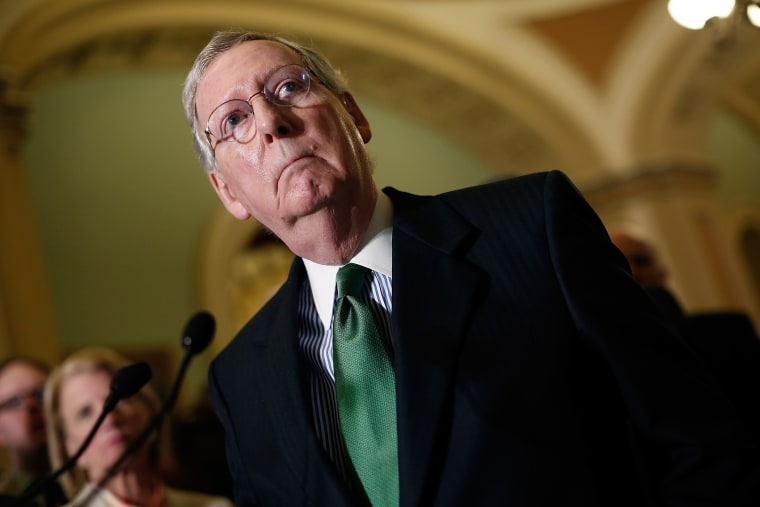It was probably Dana Milbank who sent Senate Majority Leader Mitch McConnell (R-Ky.) over the edge. The Washington Post columnist's latest installment, published in the print edition over the weekend, described the Senate's top Republican member as "a Russian asset."
Milbank quickly added, "This doesn't mean he's a spy, but neither is it a flip accusation. Russia attacked our country in 2016. It is attacking us today. Its attacks will intensify in 2020. Yet each time we try to raise our defenses to repel the attack, McConnell, the Senate majority leader, blocks us from defending ourselves."
The columnist called McConnell's tactics "unpatriotic," adding that the Kentucky Republican is "doing Russian President Vladimir Putin's bidding."
It was against this backdrop that "Moscow Mitch" spent some time trending on Twitter last week.
The Senate majority leader -- who is, incidentally, up for re-election next year -- isn't known for his emotional displays, but as Roll Call noted, McConnell "got riled up" yesterday while trying to defend his opposition to election-security measures.
"Let me make this crystal clear for the hyperventilating hacks who haven't actually followed this issue. Every single member of the Senate agrees that Russian meddling was real and is real," said McConnell. "We all agree that the federal government, state governments and the private sector all have obligations to take this threat seriously and bolster our defenses."McConnell called the criticism of his action on election security "modern-day McCarthyism" repeatedly during his fiery speech.
I can appreciate why the GOP leader was bothered. It can't be fun to be a conservative critic of Russia for many years, only to be accused, even tongue-in-cheek, of being "a Russian asset."
But there are certain factual details that McConnell can't explain away with indignation.
We know, for example, that McConnell received a classified briefing about the Russian election attack in 2016, but he balked when asked to endorse a bipartisan pushback effort in response the adversary's interference.
We also know that leading U.S. officials -- including Republicans appointed by Donald Trump -- continue to warn lawmakers about the ongoing Russian threat, urging Congress to do more to prepare a defense ahead of the 2020 cycle.
We also know that McConnell has rejected a series of recent proposals intended to bolster our domestic defenses. Some of those measures were written by Democrats; others were bipartisan; but the Senate majority leader hasn't been willing to advance any of them.
We also know that Senate Minority Leader Chuck Schumer (D-N.Y.) last week said on the chamber's floor, "I would suggest to my friend the majority leader: If he doesn't like this bill, let's put another bill on the floor and debate it." McConnell, at least so far, hasn't expressed any support for any election-security bill.
We also know that one of McConnell's top lieutenants, Senate Rules Committee Chairman Roy Blunt (R-Mo.), recently conceded every bill on election security is likely doomed because McConnell has insisted that the debate "reaches no conclusion." Blunt went on to suggest that the prospects for any legislative progress on this issue simply do not exist.
McConnell argued yesterday that he takes election security seriously, and his recent efforts to block a series of bills on the issue were motivated by sincere policy differences. Maybe so. I won't pretend to be able to read the GOP senator's mind.
But the question of McConnell's sincerity is less important than the question of McConnell's actions. U.S. officials who work on national security keep ringing the alarm about the Russian threat -- just as they did three years ago. McConnell didn't take the warnings seriously then, and he's not exactly approaching the issue with any kind of constructive urgency now.
The idea that McConnell is literally a Russian asset, complete with a handler and instructions from the Kremlin, is obviously not to be taken seriously. But the idea that Putin & Co. are pleased to see McConnell's recent passivity on election security is much easier to believe.
If the Senate's Republican leader wants to bury the "Moscow Mitch" chatter, he could endorse -- or at least begin work on -- new election-security measures at any time. There's no time like the present.
Update: The great E.J. Dionne made explicit an important detail: McConnell’s core defense of his position "is states’ rights -- the same arguments used against the Voting Rights Act. We need national standards for national elections."
